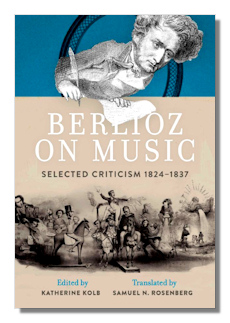
The Internet's Premier Classical Music Source
Related Links
-
Introduction
Acoustics
Ballet
Biographies
Chamber Music
Composers & Composition
Conducting
Criticism & Commentary
Discographies & CD Guides
Fiction
History
Humor
Illustrations & Photos
Instrumental
Lieder
Music Appreciation
Music Education
Music Industry
Music and the Mind
Opera
Orchestration
Reference Works
Scores
Thematic Indices
Theory & Analysis
Vocal Technique
Search Amazon
Recommended Links
Site News
 Book Review
Book Review
Berlioz on Music

Selected Criticism 1824-1837
Edited by Katherine Kolb
Translated by Samuel N. Rosenberg
Introduction, notes, bibliography, index
Oxford University Press, 300 pages
ISBN-10: 0199391955
ISBN-13: 978-0199391950 (hardcover, alkaline paper)
In her Preface and substantial introduction to this volume, Kolb, who acknowledges the pioneering work of Jacques Barzun in the middle of the last century, as well as the more recent work of David Cairns, D. Kern Holoman, Hugh Macdonald and Peter Bloom, explains the limited time frame of the book. Berlioz' complete criticism runs to ten volumes and is still in the process of being translated. Also Kolb, an expert in her own right, judges that the "musical creed" of Berlioz is pretty much fully expressed in these early writings of this composer/critic; and she says that 1837 was "just before Berlioz begins to complain he has nothing further to say about Beethoven's symphonies…" Kolb notes that Berlioz, in his own books schematizes his basic principles, but she wishes to present Berlioz's reviews in chronological order and in historical context. Each entry is numbered and individually introduced by this editor. In her long introduction she writes about "Revolutions in Paris," "Revolution in the French Musical Press", and "Music Criticism as Revolutionary Practice."
Berlioz was one of the originators of music criticism, along with Schumann around the same time, and he is very readable; he avoids technicalities for one thing. I shall focus on things and people Berlioz admired or was unhappy with. As one would expect, he was opposed to mediocrity and compromise, the lamentable state of musical education and the technical limitations of most performers outside the Paris Conservatory, as well as under-rehearsed performances. He mentions one musical group which prided itself on performing without any rehearsals! He extolls the superior attainments of certain singers, notably Cornelie Falcon, who sang the role of Donna Anna in Don Giovanni "with love, even passion," which "shows in the emotion that torments her, the way her voice trembles in certain touching passages." Another singer he singles out was the tenor, Gilbert Duprez, who after weak beginnings learned to sing "from his chest," thus achieving both power and proper intonation; this was evidently a new thing in1835, and led the way to the emergence of Heldentenors.
Berlioz celebrated the musicality of the composer Jean-Francois Lesueur, who is so unknown today as to have a recording of a single work – from 1798 – and that on a large collection of baroque composers. Here is a sample of what Berlioz says about Lesueur. His style was one of "artless simplicity and calm strength," with harmony "which almost always has a strange quality and takes unexpected turns… and no laughable cheap trappings." He wrote "very special melody" springing from his chords. His instrumentation presented accents and nuances expressive of delicate feeling. He divided the cellos so that half followed the violas and the others the basses. His timpani alternated with the bass drum. In other reviews Berlioz deplores the overuse of the bass drum in too much music of others at the time.
Berlioz wrote repeatedly of Beethoven – especially his Fifth and Pastoral Symphonies; regarding the latter he wrote a detailed description of each movement, in lyrical terms. He wrote a lot about Mozart, whom he regarded as the greatest of composers; he discusses in particular The Magic Flute and Don Giovanni – as "Don Juan"; Gluck (whom he esteemed) Handel, Liszt, Meyerbeer (surprisingly favorably), Rossini, Chopin, Antoine Reicha. He focused often on the Paris Opera and compared it unfavorably to the Opera Comique.
Because so many of the musicians he reviewed were famous only in the time of Berlioz, some may find the book slow going, but I recommended this volume strongly to anyone interested in Berlioz or the state of music in France in the early nineteenth century.
Copyright © 2015, R. James Tobin



















